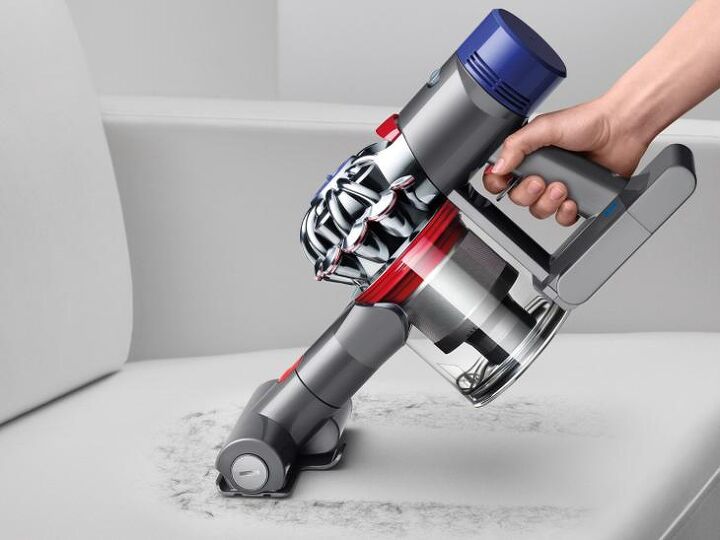Dyson Hoovers Up Talent for Electric Car

Noted dust magnate Sir James Dyson is moving ahead at cyclonic speed with his electric car endeavors, hiring 300 new employees to work on an EV due for launch in 2020.
Apparently seeing a vacuum in the car market, Dyson intends to use its expertise and recent acquisition of a battery company to clean up the world’s air pollution. Plans are moving at such a swift rate that the EV team is moving into a new state-of-the-art 750 acre campus, Dyson’s second R&D campus in Britain.
Dyson already makes a V8; sadly, it is simply the name of their cordless stick vacuum cleaner. However, if one puts all the pieces together, a low-volume EV from Dyson is not too far-fetched.
After spending $90 million in 2015 to acquire battery company Sakti3, Dyson does now appear to possess the technology to realistically push forward with the development of an EV. Sakti3, a startup company with connections to the University of Michigan, claims to have developed solid-state lithium-ion batteries which nearly double the punch provided by those found in California’s favorite EV – Tesla.
Claims aside, if Dyson can indeed figure out the solid-state puzzle it will be a huge revolution in battery technology. Right now, lithium-ion batteries generally operate at about 95 degrees Fahrenheit, necessitating complex cooling solutions. Instead of a pressurized liquid electrolyte, solid-state batteries can incorporate a thin layer of non-flammable material to act as both the separator (keeping + and – electrodes from playing together) and electrolyte.
Back in September, the company starting making noise about its forthcoming EV, releasing a wealth of information about the product on Twitter. In the statement, Sir James references his ambition to find a solution to the global problem of air pollution, a goal that certainly aligns with the production of an EV.
James Dyson just announced to @Dyson employees that we’ve begun work on a battery electric vehicle, due to launch in 2020. pic.twitter.com/yUZNvIsYIi
— Dyson (@Dyson) September 26, 2017
At that time, Dyson stated they had “over 400” people working on the EV project, meaning the new hires bring the total number of workers toiling away at a Dyson electric car to be in the neighborhood of 700 people. This, then, sure doesn’t seem like a flash in the pan or some sort of PR stunt. It’s worth noting that James Dyson himself is reportedly investing at least £2 billion of his own money to bring this car to market.
A company seeming to suddenly appear with a ready-for-market electric vehicle is not entirely without precedent. In 2017, a company called Bollinger showed up with its B1, all-electric off-roader complete with impressive off-road creds and t-square styling cues. Dyson (both the company and the inventor) has a long history of innovation and is certainly not risk-adverse, so the thought of a low-volume EV from the company does hold water.
Dyson is based in the U.K. and is a privately-held company. Its revenue has grown to £3.5 billion in 2017 from £1.7 in 2015. Almost three-quarters of that revenue growth has come from Asia. Last year’s earnings topped $1 billion USD.
[Image: Dyson]

Matthew buys, sells, fixes, & races cars. As a human index of auto & auction knowledge, he is fond of making money and offering loud opinions.
More by Matthew Guy
Latest Car Reviews
Read moreLatest Product Reviews
Read moreRecent Comments
- Mike Wasnt even a 60/40 vote. Thats really i teresting.....
- SCE to AUX "discounts don’t usually come without terms attached"[list][*]How about: "discounts usually have terms attached"?[/*][/list]"Any configurations not listed in that list are not eligible for discounts"[list][*]How about "the list contains the only eligible configurations"?[/*][/list]Interesting conquest list - smart move.
- 1995 SC Milking this story, arent you?
- ToolGuy "Nothing is greater than the original. Same goes for original Ford Parts. They’re the parts we built to build your Ford. Anything else is imitation."
- Slavuta I don't know how they calc this. My newest cars are 2017 and 2019, 40 and 45K. Both needed tires at 30K+, OEM tires are now don't last too long. This is $1000 in average (may be less). Brakes DYI, filters, oil, wipers. I would say, under $1500 under 45K miles. But with the new tires that will last 60K, new brakes, this sum could be less in the next 40K miles.


































Comments
Join the conversation
I actually have one of those Dyson V8 cordless vacs; it's far and away the best vacuum cleaner I've ever used. Lightweight and cordless, yet picks up as well as heavy plug-in units. Very quiet. A cinch to clean out - hold it over a trash can and press a button, it empties the collected dirt and cleans the filter in one action. Comfortable-to-hold handle. Easy to use attachments. A roller brush that's right at the front of the floor part and reaches all the way to the left & right edges, so you can get right up against walls or corners. The battery lasts long enough to clean the whole house. Can be used as just a dustbuster, or you can attach a tube and it will clean high shelves or curtains. It hangs on the wall when you're done with it. It's an exquisite piece of industrial engineering, designed by people who sweated the details and got everything right. If their EVs are anything like their vacuum cleaners, look out, automotive world.
If you listen to podcasts, the recent 'How I Built This' with Dyson was worth your time if you don't know much about him beyond the commercials.